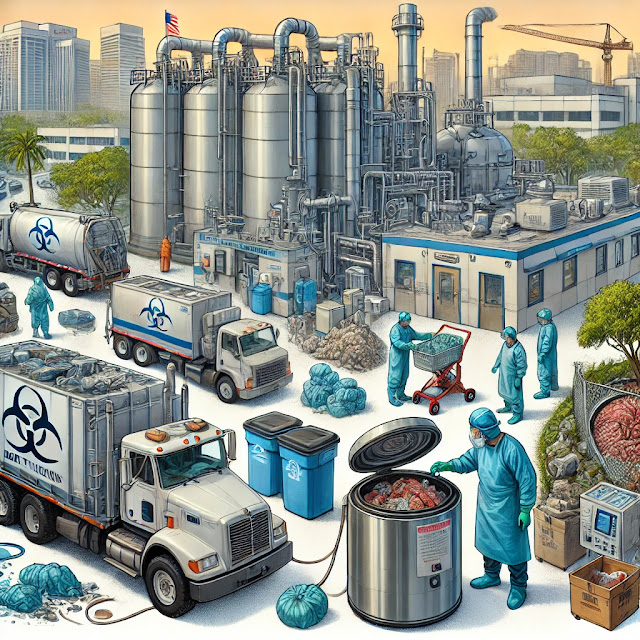Introduction
In Port St. Lucie, the vibrant heart of Florida's
Treasure Coast, the link between community health and the management of
biohazardous waste isn't just a policy detail—it's a pivotal element of public
safety. Here, the local strategy for handling biohazardous medical disposal
isn't about fear-mongering over microbes; it’s about a comprehensive approach
to ensuring every resident can enjoy the city's lush landscapes and outdoor
lifestyles without worry. Port St. Lucie's tactics are meticulously crafted, balancing
rigor with innovation, to manage what most would rather not think about—the
risky business of biohazardous waste.
Defining Biohazardous Waste
In the medical world of Port St. Lucie, biohazardous
waste is like the uninvited guest at a beach party—it needs careful handling.
Defined as any waste containing infectious materials or potentially infectious
substances, such as blood, body fluids, and sharps, this category is no small
matter. Port St. Lucie’s healthcare facilities, from high-tech hospitals to
friendly neighborhood clinics, commonly generate sharps waste, pathology waste,
and chemical waste—all of which demand strict protocols to ensure they don't
crash the community’s health party.
Public Health Implications
The sunny streets of Port St. Lucie are far from the
shadows of health risks, thanks largely to the city’s vigilance against the
improper disposal of biohazardous waste. Mismanagement here could invite a host
of unwelcome issues—like contamination of local waterways or disease
transmission, turning what should be a paradise into a cautionary tale. The
city’s commitment to stringent biohazard waste disposal in
Port St. Lucie is more than regulatory compliance; it’s a community pledge
to keep the environment safe and the public healthy, ensuring that the only
thing infectious in town is the laughter of children playing in safely
maintained parks.
Regulatory Framework and Compliance
Navigating the regulatory maze of biohazardous waste
disposal in Port St. Lucie might seem as complex as planning a space launch.
Thankfully, it's grounded by robust federal, state, and local regulations that
ensure every piece of medical waste is accounted for. From OSHA standards to
Florida-specific biomedical waste rules, these regulations are the backbone of
the city’s waste management strategy. Local healthcare facilities aren’t just
following rules; they’re setting standards, implementing the procedures that
keep biohazardous medical disposal in Port St. Lucie not just compliant but
exemplary, making sure that safety in Port St. Lucie is as common as sunshine.
Port St. Lucie’s Biohazardous Waste Management Strategy
In Port St. Lucie, an intricate system for correctly
managing hazardous medical disposals is like that of a military operation. The
city has instituted wide-ranging systems that not only comply with state and
federal regulations but also surpass them by incorporating community-centered
aspects. The local laws enforce these strategies by declaring maximum periods
for garbage collection and specifying punishments for disobeyers, which ensures
proper knowledge of rules by all facilities involved. More specifically,
distinct programs have been designed to handle unique amounts of hazardous
medical waste generated from places such as dentist offices and small clinical
practices in an effort to maintain cleanliness within Port St. Lucie.
Innovative Disposal Techniques
Innovation and eco-friendliness characterize the way
of getting rid of biohazardous waste in Port St. Lucie, which is making an
impression. One method that is particularly impressive is the autoclaving
process that makes it possible to sterilize various forms of waste without
releasing any toxic materials. Additionally, advanced thermal processes can be
used to convert waste into forms of energy thus helping solve one problem by
creating another; in general, these green methods help keep communities healthy
while improving upon their surrounding environments as well – there is no doubt
that proper waste management and environmental sustainability can co-exist.
Education and Community Outreach
Awareness is just as important as action in Port St.
Lucie’s battle against biohazardous waste. The city runs an array of
educational programs aimed at both healthcare providers and the general public.
These initiatives teach proper disposal techniques, explain the risks of
non-compliance, and highlight the city’s waste management resources. Community
outreach events, such as open days at recycling facilities and workshops in
schools, help cement understanding and support for Port St. Lucie’s waste management
protocols, making every resident a partner in the process.
Challenges and Solutions
Despite its successes, Port St. Lucie faces ongoing
challenges in biohazardous waste management, including keeping up with the
rapid advances in medical technology that often introduce new waste management
complexities. To address these, the city has fostered partnerships with
technology developers to create solutions tailored to the latest medical
innovations. Regular review meetings ensure that as medical practices evolve,
waste management strategies evolve alongside them, keeping the city’s policies fresh
and effective.
Future Directions
Looking forward, Port St. Lucie is poised to continue
its leadership in biohazardous waste management with plans to integrate more AI
and machine learning into its operations. These technologies are expected to
improve the efficiency of waste tracking and management, providing real-time
data that can help preempt issues before they arise. Regulatory adjustments are
also anticipated, likely tightening standards further and increasing the focus
on sustainable disposal methods, ensuring that Port St. Lucie remains at the
cutting edge of public health protection.
Conclusion
Port St. Lucie’s approach to biohazardous medical
disposal showcases a dynamic blend of rigorous strategy, innovative technology,
and community-focused education. By continuously refining its methods and
embracing future challenges with proactive solutions, the city not only
protects its own residents but also sets a benchmark for others to follow. In
Port St. Lucie, the management of biohazardous waste is more than a
necessity—it's a commitment to maintaining the city as a safe, healthy, and
vibrant place to live.
Check out previous article of the series:
“Jacksonville’s Blueprint for Safer Healthcare Waste Management”
Go back to the first article of the series:
“From Hospitals to Clinics: Tampa’s Approach toMedical Waste Removal”

Comments
Post a Comment